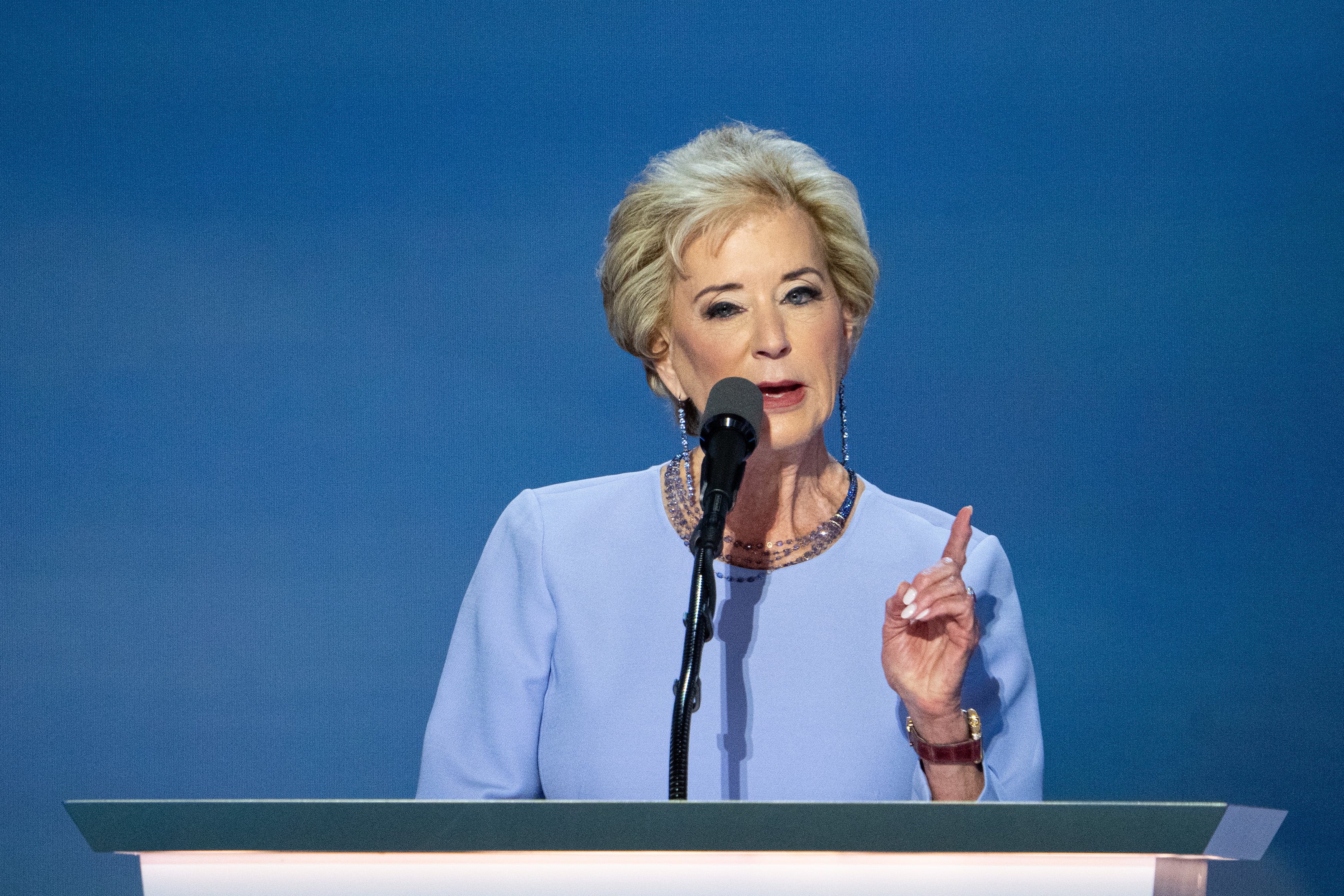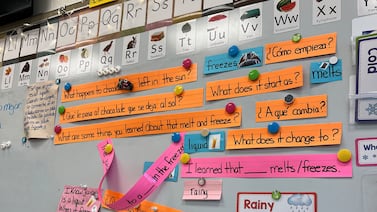Sign up for Chalkbeat’s free weekly newsletter to keep up with how education is changing across the U.S.
Former professional wrestling executive and billionaire Linda McMahon is President-elect Donald Trump’s pick to lead the U.S. Department of Education, an agency Trump has pledged to dismantle.
McMahon would come to the post with sparse education experience. She led the Small Business Administration in Trump’s first administration and also led a pro-Trump spending group and think tank before serving as transition team co-chair. McMahon reportedly was in the running for commerce secretary but was passed over for Cantor Fitzgerald Chief Executive Howard Lutnick.
McMahon is the co-founder and former CEO of the WWE professional wrestling franchise with her husband Vince McMahon.
Trump announced the selection Tuesday evening on Truth Social after multiple news outlets reported it. He cited McMahon’s business and administrative experience and called her a “fierce advocate” for parents’ rights and school choice.
And he seemed to reference a much reduced role for the Education Department, if not its actual elimination.
“Linda will use her decades of Leadership experience, and deep understanding of both Education and Business, to empower the next Generation of American Students and Workers, and make America Number One in Education in the World,” Trump wrote. “We will send Education BACK TO THE STATES, and Linda will spearhead that effort.”
In a podcast interview this fall, McMahon said her entry into politics began after she read about how students in the Greenwich, Connecticut, school district were falling short of expectations spelled out in No Child Left Behind. That 2002 federal law, championed by President George W. Bush, held schools accountable for student performance through test scores and other measures. Many Republicans have since moved away from that type of federal oversight.
“I’m sitting there thinking, ‘How could that be possible in Greenwich, Connecticut?’” McMahon said. “It’s a very wealthy community. We pay a great deal of our taxes toward education. How can that happen?”
She described a period of visiting charter, public, and private schools before Gov. Jodi Rell, a friend, invited her in 2009 to fill a vacancy on the Connecticut State Board of Education.
“I said, ‘Look … I’m certainly not in the world of education,” McMahon said on the podcast. “I don’t know if this is what you’re looking for. And she said, ‘I’m looking for exactly who you are: somebody from the outside who could come in, and I want feedback from that.’”
When McMahon was nominated, she told Connecticut lawmakers she had originally aspired to be a teacher and said interest in education had been “a significant constant” in her life. She pointed to her involvement in her own children’s education. And she spotlighted several WWE programs, including one that sent wrestlers into schools to deliver positive messages and another, the WrestleMania Reading Challenge, which featured posters of wrestlers encouraging students to read.
McMahon left the State Board after a year in office to pursue an unsuccessful Senate bid.
She also served twice on the board of trustees for Sacred Heart University, a private Roman Catholic university in Connecticut.
Trump has made a series of startling choices for his initial cabinet picks, often favoring loyalists with little experience or advocates whose goals are opposed to the agencies he wants them to lead.
In choosing McMahon, Trump passed over experienced Republican state superintendents like Cade Brumley of Louisiana and dedicated culture warriors like Tiffany Justice, the co-founder of Moms for Liberty whose name was floated as a potential education secretary.
Trump campaigned on getting rid of the U.S. Department of Education, expanding school choice, rolling back Biden-era Title IX changes that expanded legal protections for transgender students, and punishing “woke” schools.
McMahon echoed concerns about “woke” thinking in the podcast interview this fall while also saying diversity is important.
“There’s too much of our woke environment,” she said. “There’s too much emphasis on DEI. Now, diversity, equity, and inclusion is important. I believe everybody should have the same opportunity, everybody should be treated equally. There is no room in our society for prejudices, like we are seeing now with anti-Semitism or … the racial inequality we’ve seen over the years. But I think we’ve continued to make strides.”
Getting rid of the U.S. Education Department would require congressional action and careful administration to determine which programs to end and which to move to other departments. Most observers expect that to be a substantial task that would divide Republicans and require significant political will to carry out. The idea has been proposed before and never gotten much traction.
On the other hand, some of Trump’s other ideas, like using federal funding to pressure schools to adopt more patriotic curriculum or end diversity initiatives, would require a bureaucracy — like that provided by the U.S. Department of Education — to carry out.
The Republican Party platform, which Trump shaped, also called for better connecting education to work opportunities, an issue that could be a rare point of bipartisan cooperation on education policy. In a September op-ed published in The Hill, McMahon supported a bipartisan bill to expand access to Pell grants for short-term credential programs.
The early reaction to Trump’s selection was mixed and fell along some expected ideological lines.
Justice, of Moms for Liberty, praised the pick, posting on the social media site X that McMahon “understands the assignment.” Rick Hess, director of education policy studies at the conservative American Enterprise Institute, said he looked forward to learning more about her but otherwise withheld judgment.
In an emailed statement, American Federation of Teachers President Randi Weingarten also said she wants to know more about McMahon and hopes Trump is serious about improving career and technical education and expanding apprenticeships, even as she urged him not to get rid of the Education Department.
National Education Association President Becky Pringle took a different tack, decrying McMahon as “grossly unqualified.”
“By selecting Linda McMahon, Donald Trump is showing that he could not care less about our students’ futures,” she said in a statement.
If nominated and confirmed, McMahon would replace Miguel Cardona, President Joe Biden’s education secretary. Cardona oversaw pandemic recovery efforts, a beleaguered student loan forgiveness initiative, and the bungled revamp of the federal financial aid process.
During his first term, Trump chose Betsy DeVos, a staunch supporter of private schools and school choice, as his education secretary. She had some impact on K-12 education policy, most notably by scaling back civil rights investigations, rescinding guidance that spelled out protections for transgender students, and installing new rules about how schools should handle allegations of sexual assault.
But she failed to achieve her major policy goals, including offering federal tax credits to help families pay for private school tuition and shrinking the size of the federal education budget. She lacked congressional support for both proposals — a barrier the next education secretary may not face.
Erica Meltzer is Chalkbeat’s national editor based in Colorado. Contact Erica at emeltzer@chalkbeat.org.






